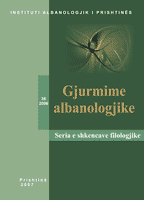ARSHI PIPA DHE KOSOVA E POEZISË SË TIJ
ARSHI PIPA AND HIS POETRY ABOUT KOSOVA
Author(s): Myrvete Dreshaj-Baliu, Begzad BaliuSubject(s): Literary Texts
Published by: Instituti Albanologjik i Prishtinës
Keywords: ARSHI PIPA ; POETRY ABOUT KOSOVA
Summary/Abstract: In creative and political life of Arshi Pipa, Kosova and its complex history, by itself or jointly with other issues, appears in a diversity of dimensions. Therefore, its treating is complex and interdependent, both by life premises, and even by his personal ones, or by literary principles and esthetical taste of the generation he belonged to. Perhaps this is the reason why some his life, literary, political, cultural and scientific essences (gist), not always within time and space, appear complement-tary for the time when they were created, and for our time as well. The author with pronounced imagination, scholar with a multidimensional ascribe, expert in medieval and ancient aesthetics, focused on Italian ad French aesthetics, lecturer, researcher, translator and editor of Western literature, focused on classic authors, Arshi Pipa has given the individual model of an engaged intellectual in national question on the basis of the Western model. In this context should be viewed his political and esthetical concepts, linked up with the Kosova subject, and also inter-weaves which are linked up with its past and its future. Inside this subject could be dealt three essential questions of poe-tics, of history and his culture: I: Poem “Shqipnia = Albania” (Kosova as a geographical and historical unit of ‘Antique Albania’) and poem “Mbreti Labeat = King Labeat” (inside which can be discussed his scientific concept about the origin of Albanian people); II. Poems “To Kosova” and “Drenica’s Legend” (one of them de-dicated and the other narrative), through which at the same time can be discussed his political and intellectual position (attitude), towards tragically developments of that time linked with tragically situation in Drenica after the Second World War and political concepts of Albanian state towards Kosova; and III: "Rusha", a poem which in post scriptum, Arshi Pipa calls a Kosovan poem, which allows area for discussion about the context of its writing: his prearrangement to escape to Yugoslavia or the moment of his endeavour to give a new variant of De Rada’s “Songs of Milosao”. In these three levels, where Kosova is presented as a text and context at the same time historical, cultural and esthetical, Arshi Pipa raises big macro structural problems (as bearer of history), of ideas (as a cultural tradition) and of poetry (as a transformation of literary oral genre and linguistic archetype of aesthetics of literature “in verses”, as the author would do). Pipa overthrows Thomas Eliot’s concept that a poem filled with information is turned to prose. On the contrary, he thinks that by writing on the basis of a rhythmic, sonorous and phraseology principle of ordinary language, but enriched by the people, could express the best his personality and the truth he says. [...9
Journal: Gjurmime Albanologjike - Seria e shkencave filologjike
- Issue Year: 2006
- Issue No: 36
- Page Range: 203-217
- Page Count: 15
- Language: Albanian
- Content File-PDF

